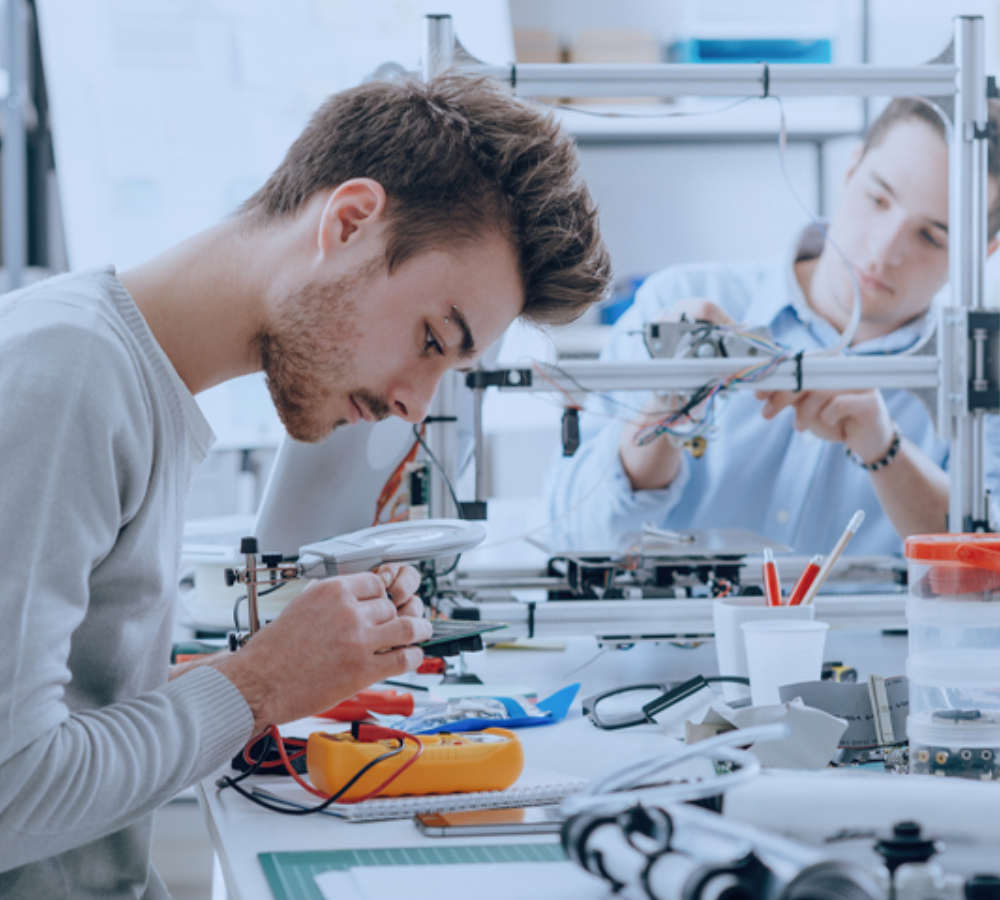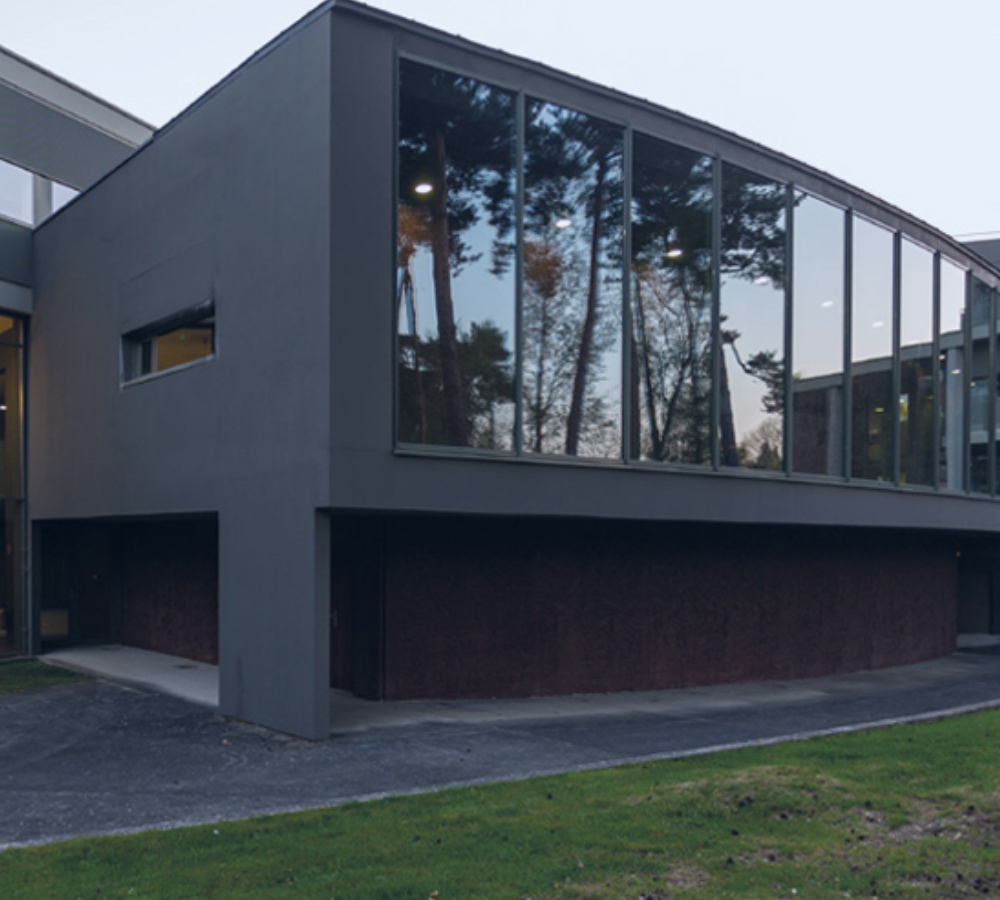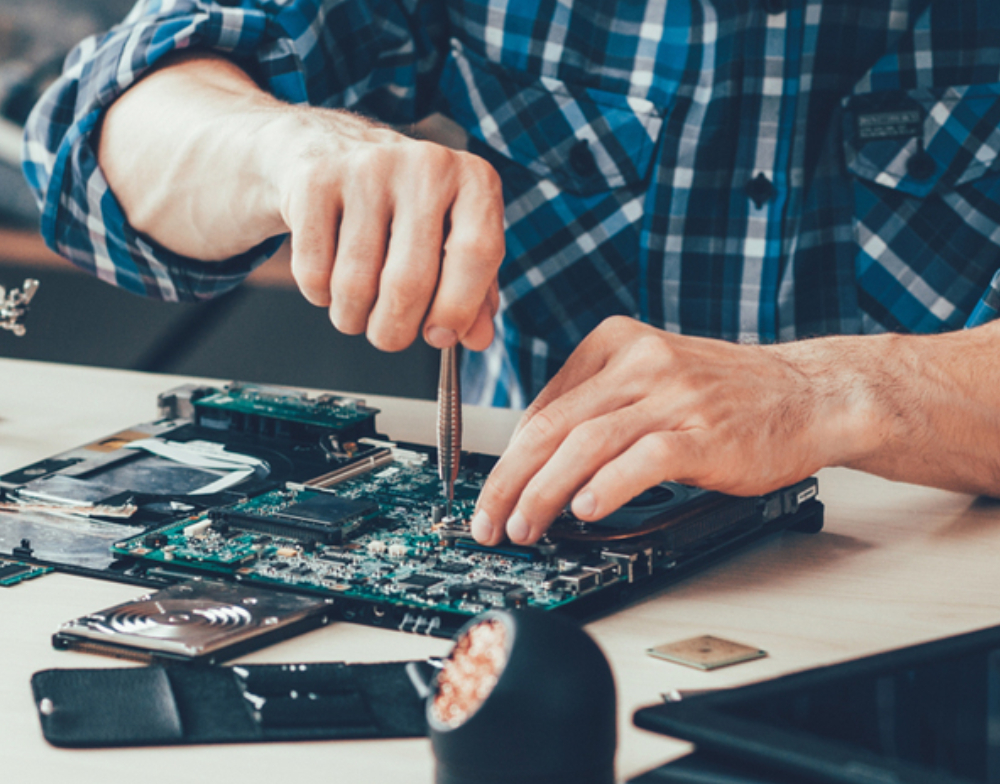Innovative and sustainable systems integration solutions for a world that must be future-ready.
The IRSEEM, our Research Institute for Embedded Electronic Systems (Institut de Recherche en Systèmes Electroniques Embarqués) is a R&D laboratory where faculty and students conduct systems-oriented research in order to lead innovative advancements in their fields.


IRSEEM | The Organization
The IRSEEM (Institut de Recherche en Systèmes Electroniques Embarqués – Research Institute for Embedded Electronic Systems) was founded in 2001 by ESIGELEC.
The research at IRSEEM is focussed around the central research theme of ‘Cyber-physical systems in severe environments’. Its activity is structured around 3 main clusters: Automation & Systems, Electronics & Systems, and Instrumentation, Computing & Systems. IRSEEM’s activity clusters combine their skills in electronics, automation and computing within partnership research programs in order to provide innovative and sustainable systems integration solutions.
IRSEEM is an Equipe d’Accueil-certified reception team (EA 4353) providing joint supervision with the University of Rouen Normandy.will be the same.
IRSEEM | The Mission
The laboratory’s mission is to conduct systems-oriented research while covering the complexity and
transdisciplinarity of research and development subjects.

The Activity Clusters

Automation & Systems Cluster
Robust system control, robust diagnostics/prognostics, estimation
Electronics & Systems Cluster
Electromagnetic compatibility, reliability, microwave frequency components and circuits, microelectronics, power electronics
Instrumentation, Computing & Systems Cluster
Vision and localisation, embedded software, autonomous mobility, multi-agent cooperative systems
In addition to these three clusters, the laboratory has a Research and Development Innovation Service (SIRD).
SIRD supports economic actors in the innovation and R&D process. We are here to help companies and researchers put in place a complete chain for evaluating needs and knowledge. SIRD’s function revolves around autonomous navigation, EMC and chassis dynamometer provision.
Fields of Activity

Automotive

Aeronautics

Renewable Energy

Electronics

Mobility

Telecom

Biomedical

Robotics

Transport,
Logistics & Safety

Microelectronics & Power Electronics

Every once in a while, a new technology, an old problem, and a big idea turn into an innovation.
Dean Kamen
01
Automation & Systems Cluste
The AS cluster’s research activity focuses on the theme of Fault Tolerant Control (FTC).
From the Automation point of view, this is a concrete response to the industry’s growing demand for reliable and dependable mechatronic systems. It aims to maintain the robust performance of these systems in all circumstances, particularly in the event of a malfunction.
RESEARCH AREAS
Advanced control for performance robustness
Predictive control
Sliding mode control
Diagnostics/Defect prognostics
Robust model-based diagnostics
Signal processing diagnostics
Prognostics for improvement of maintenance and availability
Estimation
Extended continuous-discrete observers
Robust estimators

SIMULATION & EXPERIMENTATION PLATFORMS
Hybrid and Electric Vehicle Platform:
1 Euro 6 chassis dynamometer for 4-wheel drive vehicles, gas and energy consumption analysis bays
Nacelles of the Future Platform (Safran Nacelles joint laboratory):
nacelle test bench, variable-frequency drive/electric motor test bench
02
Electronics & Systems Cluster
The research activity of the ES cluster focuses on the fields of electromagnetic compatibility (EMC), microwave frequencies, electromagnetism and power electronics.
These competencies are contributing to the development of the team’s research activity in connection with the general theme of cyber-physical system dependability in severe environments. In our work, this theme is divided into two complementary areas: EMC & Electromagnetism, and Reliability.

RESEARCH AREAS
EMC & Electromagnetism
Modelling and characterisation in EMC
Physical modelling of signal integrity and electromagnetic phenomena
Modelling and characterisation of electronic components
Design of electronic and electromagnetic devices (sensors, antennas, radio frequency and microwave circuits, energy recovery devices)
Characterisation of materials for microwave frequency and EMC applications
Reliability of components and systems
Characterisation of electronic systems under severe stress
Reliability of electronic components and systems (wide-bandgap power components and passive components)
Modelling and ageing tests
SIMULATION & EXPERIMENTATION PLATFORMS
EMC/Mechatronics/Microelectronics Platform
EMC testing facilities: anechoic chambers, dedicated measurement benches for component reliability and electrical and electromagnetic simulations.
Microelectronics Platform
Nacelles of the Future Platform (Safran Nacelles joint laboratory): nacelle test bench, variable-frequency drive/electric motor test bench
03
Instrumentation, Computing & Systems Cluster
The research activity of the IIS cluster focuses on new digital technologies and the paradigm shifts they bring about: sensors, mass data, communicating embedded systems, and artificial intelligence.
The work fits in with the broader themes of robotics and cooperative systems with applications in the field of autonomous vehicles and new forms of mobility, health, and the factory of the future.
RESEARCH AREAS
Perception and localisation for autonomous mobile robotics
Autonomous navigation. The machine must perceive, analyse and make decisions in real time
Perception layer for position (localisation), speed (odometry), obstacles (surrounding environment)
Cooperative systems (communicating)
Data sharing and merging between systems using wireless communications

SIMULATION & EXPERIMENTATION PLATFORMS
Perception and localisation for autonomous mobile robotics
Autonomous Navigation Platform: 150 m2 motion capture room with VICON system, laser scanner station, fleet of mobile robots, vehicle- mounted solution for precise trajectory measurement and 3D environment, mechanical integration workshop, rapid prototyping software for on-board testing and measurement, and 3D simulation environment.